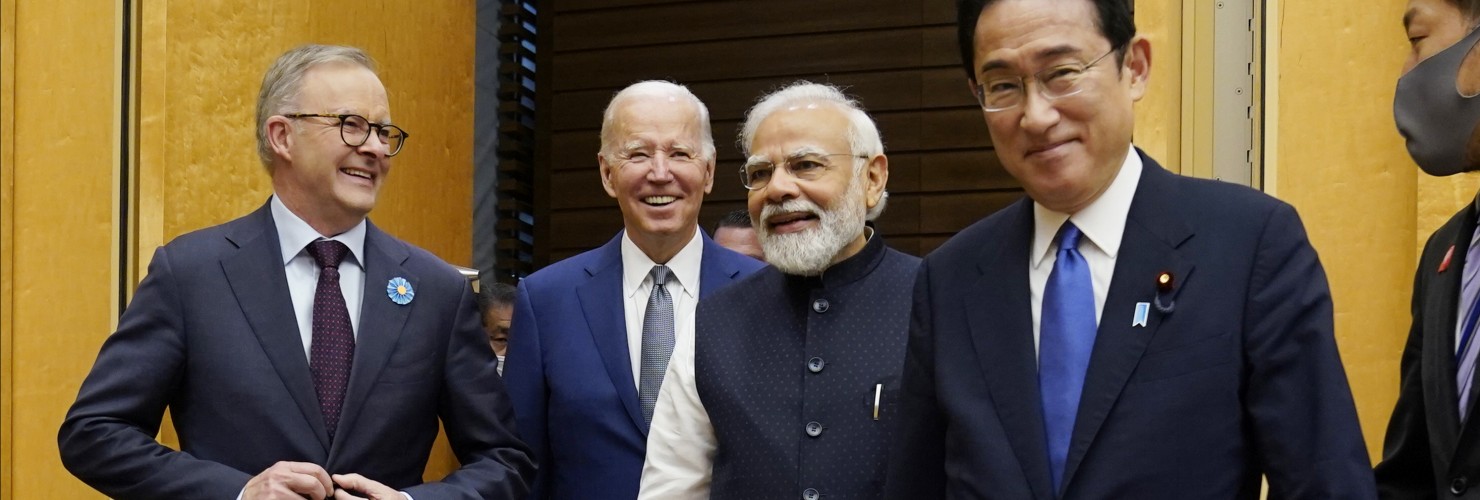

A return of bloc politics?
Beijing is furious at what it sees as the emergence of the long-feared US-led coalition to contain China. With the world moving toward an increasingly bipolar order, countries, particularly in the Indo-Pacific, are likely to feel growing pressure to pick a side. By Helena Legarda
In a speech on May 26, US Secretary of State Antony Blinken unveiled the long-awaited outlines of the Biden administration’s China strategy. Arguing that it is China that poses the most serious long-term challenge to the international order, he introduced a tripartite approach to relations with Beijing built on three priorities: “invest, align, compete.” The United States will invest in its own capabilities, align its efforts with allies and partners, and compete with China to defend its interests.
Beijing’s response to Blinken’s speech was as angry as expected. But what truly touched a nerve was the public confirmation that the US is seeking to create new coalitions in the Indo-Pacific and elsewhere to counter the challenges posed by China.
The rhetorical response came immediately. Calling the speech “disinformation” and a “smear,” China’s Ministry of Foreign Affairs issued a hard rebuke, claiming that the US Indo-Pacific Strategy was created “to rope in regional countries to encircle and contain China” and “is doomed to fail.” Attacks on Washington’s “Cold War mentality” and “bloc politics” have since multiplied on official Chinese media.
But it isn’t this narrative that should be of most concern to Europe and the United States, or to their likeminded allies and partners. Strident language is, after all, par for the course in Beijing these days. The more serious long-term challenge to the global order and the rules that underpin it will instead come from the acceleration of Beijing’s plans to build a competing network of countries to push back against the US and the Western-dominated order.
Old concerns, new urgency
Competition with the United States—and the West in general—for dominance in Asia and around the world has long colored the Chinese Communist Party’s worldview and foreign policymaking. Beijing has always been concerned that the US will use its presence and its network of partnerships and alliances in the Indo-Pacific to encircle China and to prevent its return to its rightful place as a global power.
And NATO’s potential expansion into the Indo-Pacific—or the establishment of a similar format in the region—in order to achieve this goal has for years worried Chinese analysts and officials alike. The transatlantic alliance is, after all, seen in Beijing as a US-dominated format that Washington uses to protect its “global hegemony.” China’s ambassador to the United States, Cui Tiankai, was already warning Washington against any attempts to establish an “Asia-Pacific version of NATO” back in 2014, prior to the rapid deterioration of relations between the two powers under President Donald Trump.
The launch of the United States’ Indo-Pacific Strategy and of the Quad format that brings together the US, Japan, India, and Australia—both in 2017—certainly did nothing to help assuage China’s fears of encirclement. But it is only during the last few months that tensions have truly come to a head.
Washington’s efforts in the past were deemed to have only had limited success, as most Indo-Pacific countries remained reluctant to “take sides” despite China’s increasingly assertive behavior, thus curbing Beijing’s threat perceptions. But Russia’s invasion of Ukraine and the West’s decisive—and united —response to it have changed the dynamics. Longstanding concerns over China’s behavior and ambitions are now compounded by a new awareness of the extent of Beijing’s alignment with Moscow and by fears that a conflict in the Indo-Pacific in the not-too-distant future is not out of the question.
Closer alignment between the US and other partners such as the EU is clearly becoming a more attractive option for many regional actors hoping to deter China from moving toward such a scenario, or at least to improve their position should it come to pass.
The most recent Quad leaders’ summit, AUKUS, the Indo-Pacific Economic Framework, and even the EU’s summits with Japan and India are being read in Beijing as clear signs that Washington’s efforts to stand up a coalition to confront the China challenge are getting renewed traction, increasing the urgency to push back forcefully, both in rhetoric and policy.
Competing coalitions
Chinese Foreign Minister Wang Yi has repeatedly criticized Washington’s approach to the Indo-Pacific, noting that it is “becoming a byword for ‘bloc politics,’ and it seeks to maintain the US-led system of hegemony.”
But the fact of the matter is that, despite all this criticism and China’s traditional view of alliances as potential liabilities, Beijing has long followed a very similar strategy, and its efforts have only accelerated in recent months. Accompanying its increasingly harsh rhetoric, Beijing has launched a wide-ranging diplomatic offensive to expand its own global influence at the expense of the West’s, focusing in particular on countries in the Global South. Beijing sees very clearly what is at stake: The success or failure of China’s ambitions to return to global power status by 2049 and to transform the current international order will hinge on how non-Western countries respond to Beijing’s growing strategic footprint and its competition with the US.
The reframing of the Belt and Road Initiative (BRI) into a high-quality and high-standards-focused program, the launch of the new Global Development and Global Security Initiatives, the calls to expand the BRICS format, or the concerted push for influence in the South Pacific are clear signs of Beijing’s ambition to build an alternative network of countries to counter the long-feared and now seemingly emerging Western coalition to contain China. By establishing itself as the standard bearer for developing nations and all other countries that are in any way dissatisfied with the West or with the current global order, Beijing hopes to at least limit other countries’ alignment with the US. And at best, it hopes to create a competing coalition that would allow China to push back and advance towards its goal of reforming the global order.
Countries in the Global South are not China’s only target, however. Europe has also been the target of Beijing’s diplomatic push. China wants to bring relations with European countries back on track after the damage caused by its response to the war in Ukraine. But it is also trying to weaken the renewed transatlantic alignment that has emerged since. President Xi Jinping could not have been clearer about this during a call with German Chancellor Olaf Scholz in May, when he warned against “bloc confrontation” and called for European countries to keep European security in their own hands (read: to distance themselves from the United States).
The road to bipolarity
Despite hopes for stability in the run-up to this fall’s 20th Party Congress of the Chinese Communist Party, Beijing feels increasingly threatened by the recent developments in the Indo-Pacific. Growing US and European engagement with regional partners is fueling worries that the long-feared US-led coalition to contain China is finally emerging. This explains Beijing’s frantic response.
Facing an increasingly hostile international environment and under pressure due to the “many crises stacked up” (多重危机叠加) that China must deal with at the moment, the country’s leadership is doubling down on competition with the West. As this “bloc mentality” increasingly takes hold in Beijing, and since Xi Jinping is highly likely to secure another term at the helm of the party, China’s foreign policy trajectory seems set for the near future. Convinced that the US is intent on starting a new Cold War with China, geopolitical competition with the US—and the West in general—will remain the critical reference point for any future Chinese action.
This is not to say that two distinct, separate blocs will necessarily form. We live in uncertain times, after all. And most countries around the world, including in Europe, will try their best to avoid such a development. But it is undeniable that the world is moving toward an increasingly bipolar order, in economic, technological, and geopolitical terms. Countries, especially in the Indo-Pacific, are likely to feel growing pressure to lean in one direction or the other. And Beijing is already threatening consequences. Chinese foreign ministry spokesperson Wang Wenbin recently advised the US to listen to the lyrics of a popular Chinese song: “For our friends, we have fine wine. For jackals or wolves, we welcome with shotguns.”
This article was first published by Internationale Politik Quaterly on June 07, 2022.

